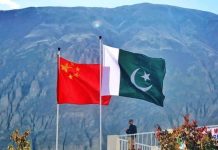By Mahnoor
Makhdoom
ISLAMABAD: Pakistan’s exports to China has increased by 30 percent month on month in November 2020, improving trade balance between the both countries.
To address issue of trade deficit, the major concern of Pakistani side, China has proactively taken a lot of measures, such as expanding more market access for Pakistani products and organizing varieties of trade promotion activities.
Adviser to Prime Minister of Pakistan for Commerce and Investment Abdul Razzaq Dawood recently said in a tweet that during Nov 2020, exports to China has increased by 30 %, Vietnam by 121%, United Kingdom by 27%, Italy by 26%, United States by 25% and France by 22%.
This healthy trend is an indication that exports are regaining momentum. The exporters therefore should aggressively market their products in geographically diversified areas, he further added.
Giving a good start, Dawood previously promised to slash tariffs on more than 300 categories of imported items that are widely used as raw material for the exports of goods.
Along with the constant upward trend of China-Pakistan trade, a rising concern on trade deficit with China has been echoing in the business communities. It is pertinent to mention that the main reason behind the trade imbalance is the structural problem in nature between industries of the two countries.
China has a strong manufacturing base to export goods as compared to import. Up to now, China has turned out to be the largest trading partner of more than 120 countries and regions in the world. China has never intentionally pursued the trade surplus, not with any trade partner.
For Pakistan, it is time to dedicate some technical and financial resources to drawing a full map to expand exports to the entire world, and more specifically to China. It is up to the subject specialists to come up with viable options for reducing Islamabad’s trade deficit with Beijing and improve trade balancing.
Moreover, it is up to the political leadership of the two countries to sort out this issue as early as possible. That will also deepen their strategic geopolitical ties.
The outbreak of the novel coronavirus has led to economic recession in major parts of the world and year 2020 is going to end with a deeper recession than the one seen in the wake of the global financial crisis more than a decade ago.






